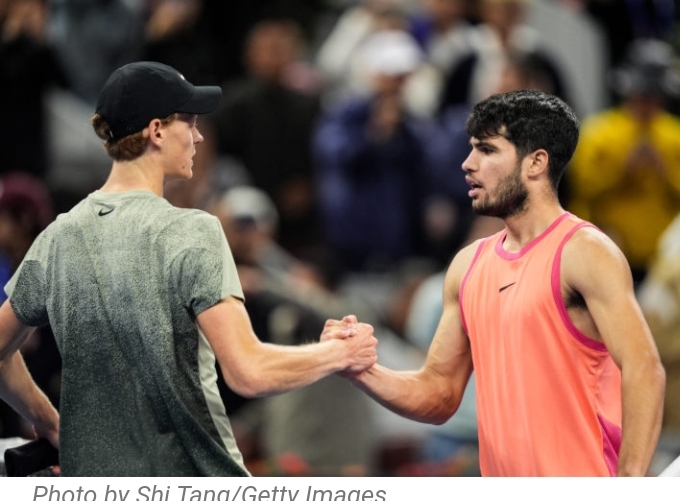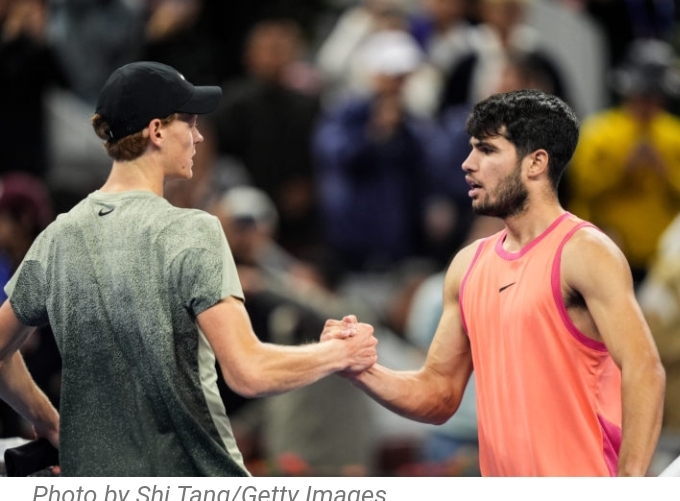CELEBRITY
Just in:John Isner and Jack Sock both left very surprised after hearing what Carlos Alcaraz has said recently… Read more.

Just in:John Isner and Jack Sock both left very surprised after hearing what Carlos Alcaraz has said recently… Read more.
In the ever-evolving world of professional tennis, few players have captured the spotlight quite like Carlos Alcaraz. The 21-year-old Spanish sensation, already a four-time Grand Slam champion, continues to make waves both on and off the court. Recently, his candid remarks about the pressures of chasing the ATP World No. 1 ranking left former American tennis stars John Isner and Jack Sock visibly taken aback. Speaking on their popular Nothing Major podcast, the retired pros expressed a mix of surprise and admiration for Alcaraz’s vulnerability, shedding light on the mental challenges faced by one of tennis’s brightest young talents as of April 9, 2025.
Alcaraz’s Rise and the Weight of Expectations
Carlos Alcaraz burst onto the scene with his 2022 US Open triumph, followed by back-to-back Wimbledon titles in 2023 and 2024, and a Roland Garros victory in 2024. At just 21, he’s already etched his name among the sport’s elite, drawing comparisons to legends like Rafael Nadal and Novak Djokovic. However, despite his meteoric rise, Alcaraz finds himself ranked No. 3 in the world, trailing behind Jannik Sinner and Alexander Zverev as the 2025 season progresses. This gap, combined with the lofty expectations placed upon him, has evidently taken a toll—one that Alcaraz recently laid bare in a surprising confession.
During a press interaction following his victory at the Rotterdam Open earlier this year—his first title of the 2025 season—Alcaraz opened up about the mental strain of pursuing the top spot. “A lot of people were asking or telling me that I have the chance to become number one if Jannik is not playing,” he said. “Probably that pressure has killed me in some way.” This admission, coming from a player known for his relentless energy and fearless play, caught many off guard—including Isner and Sock.
Isner’s Take: A Surprising Revelation
John Isner, the towering American who retired in 2023 after a career highlighted by his booming serve and a peak ranking of No. 8, didn’t hold back his astonishment on the Nothing Major podcast. “I want to talk about something that Carlos Alcaraz said,” Isner began. “He revealed the pressure to overtake Jannik Sinner as he was out for three months as number one in the world adversely affected his performance. I’m surprised a little bit as well. He and Zverev don’t seem like ones who would be saying this to make up for some results they weren’t expecting.”
Isner’s reaction underscores a key point: Alcaraz’s openness is rare for a player of his stature. At 21, with a game that blends power, finesse, and athleticism, he’s often seen as a near-invincible force. Yet, his admission hints at a deeper struggle—one that even a player of his caliber isn’t immune to. “There’s probably a lot more going on in the mind than people think,” Isner added, suggesting that Alcaraz’s mental game, while still maturing, is a critical factor in his quest for dominance.
Isner, who has followed Alcaraz’s career closely, also sees this vulnerability as a sign of growth. “His best tennis, one could argue, is five years from now,” he noted in a separate podcast episode earlier this year. “He hasn’t even reached his peak. He’s still so young and has so much maturing to do, even though he’s so ridiculously good.” For Isner, Alcaraz’s willingness to share his struggles only enhances his potential, painting a picture of a champion who’s as human as he is extraordinary.
Sock’s Perspective: Fans Crave Vulnerability
Jack Sock, Isner’s longtime friend and doubles partner, echoed the sentiment of surprise while highlighting the broader appeal of Alcaraz’s honesty. “I think fans and people always appreciate seeing the vulnerable side of athletes and people they look up to and like to watch,” Sock commented on the podcast. “So I think any info and intel about what is going on inside an athlete’s mind is always going to be talked about and in the news. I love that he is opening up about it.”
Sock, a former top-10 singles player and Olympic medalist, knows firsthand the pressures of professional tennis. His reaction reflects an understanding of how rare it is for elite athletes to peel back the curtain on their mental battles. Alcaraz’s admission, in Sock’s view, isn’t a sign of weakness but a bridge to connect with fans who idolize him. “I am surprised a little bit as well,” he admitted, aligning with Isner’s take. “He doesn’t seem like one who would say this just to explain away a loss.”
Sock’s praise also points to Alcaraz’s maturity beyond his years. At an age when many players are still finding their footing, the Spaniard is navigating the spotlight with a level of self-awareness that’s uncommon. This openness, Sock believes, will only deepen the tennis world’s appreciation for him as he continues to evolve.

The Context: Alcaraz’s 2025 Season So Far
To understand why Alcaraz’s comments struck such a chord, it’s worth examining his 2025 season to date. After a stellar 2024 that saw him clinch two Majors, expectations were sky-high for the young Spaniard. Yet, the early months of 2025 have been a mixed bag. He reached the quarterfinals of the Australian Open, falling to Novak Djokovic, and suffered a surprising loss to Jiri Lehecka in Doha after squandering a strong position in the third set. His Rotterdam victory offered a glimmer of hope, but it’s clear that consistency—particularly against top rivals like Sinner—remains elusive.
Sinner, the current World No. 1, has been a thorn in Alcaraz’s side, with the Italian enjoying a breakout 2024 that included an Australian Open title and a year-end No. 1 ranking. Alcaraz, despite beating Sinner twice last year (including a pivotal Roland Garros win), has struggled to close the gap in 2025. The pressure to capitalize on Sinner’s occasional absences—such as during a three-month stretch when the Italian was sidelined—appears to have weighed heavily on him, as his recent comments suggest.
Why This Matters for Tennis
Alcaraz’s revelation, and the subsequent reactions from Isner and Sock, highlight a broader shift in tennis culture. Historically, top players have often projected an air of invincibility, masking the internal battles that come with competing at the highest level. But Alcaraz, like a growing number of younger athletes across sports, is unafraid to show his human side. This transparency resonates in an era where mental health awareness is increasingly prioritized, offering fans a more relatable—and inspiring—view of their heroes.
For Isner and Sock, both of whom faced their own pressures during their careers, Alcaraz’s words serve as a reminder of the sport’s relentless demands. Isner, known for his marathon matches (including the infamous 70-68 fifth set at Wimbledon in 2010), and Sock, who battled injuries before transitioning to a successful doubles career, understand the grind all too well. Their surprise isn’t just about Alcaraz’s candor—it’s about the fact that a player so young, and so successful, is already grappling with the weight of expectation in such a public way.
Looking Ahead: Alcaraz’s Path Forward
As of April 9, 2025, Alcaraz remains a force to be reckoned with. His next challenge lies in the spring season, where he’ll aim to defend his Indian Wells title—a tournament where he’s won the last two years. Isner has already pegged him as the “overwhelming favorite” there, citing the slow courts and high-bouncing conditions that suit his game perfectly. But beyond the trophies, Alcaraz’s journey will be defined by how he manages the mental hurdles he’s now openly acknowledged.
For fans, analysts, and former players like Isner and Sock, Alcaraz’s recent statements are a window into the mind of a champion still finding his way. His honesty may have surprised the tennis world, but it’s also a testament to his character—and a hint that his greatest achievements may still lie ahead. As Isner put it, “He’s ridiculously good already at 21 years old.” If that’s the baseline, the peak could be something truly spectacular.












